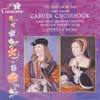Carver (The) Thistle and the Rose
A disappointing anthology of mixed-coin 15th-century Scottish polyphony
View record and artist detailsRecord and Artist Details
Composer or Director: Robert Carver
Genre:
Vocal
Label: Gaudeamus
Magazine Review Date: 8/2004
Media Format: CD or Download
Media Runtime: 65
Mastering:
Stereo
Catalogue Number: CDGAU342

Tracks:
| Composition | Artist Credit |
|---|---|
| Missa Pater creator omnium |
Robert Carver, Composer
Alan Tavener, Conductor Cappella Nova Robert Carver, Composer |
| Mass for three voices |
Robert Carver, Composer
Alan Tavener, Conductor Cappella Nova Robert Carver, Composer |
| Magnificat |
Robert Carver, Composer
Alan Tavener, Conductor Cappella Nova Robert Carver, Composer |
Author: Fabrice Fitch
The Carver Choirbook, housed in the National Library of Scotland, is named after the composer and canon of Scone, Robert Carver, whose extant works it contains and who is thought to have copied it. Ten years or so ago, Cappella Nova issued a multiple-CD set of his complete works on what used to be ASV. The present volume is something in the way of a sequel, and contains three anonymous works (probably by different composers) from the same manuscript.
The music is a mixed bag, to say the least. The Mass Deus creator omnium is an accomplished mid-15th century English four-voice Mass reminiscent of the style of Walter Frye (as Kenneth Elliott observes in his notes), but a number of details argue against his authorship. Perhaps more accomplished is the Magnificat, which may be identical with one of the lost works from the Eton Choirbook (again following Elliott) later in the century. The three-voice Mass is in a different league of accomplishment altogether. It sounds like a sketch, and (in the longer movements anyway) an unfinished sketch at that: I cannot agree with Elliott’s suggestion that the Gloria and Credo have been intentionally shortened. (The ‘concluding’ cadence of the Credo does not come on the final; actually, it is not a cadence at all. For me, both movements are fragments.) A number of things point to Carver himself as the composer, not least the fact (let me be frank) that several other works of his are just as thin.
Given all that, the disc would be easier to recommend if the performances were more convincing. This is clearly a talented group, but (on this showing at least) they lack the degree of cohesion necessary in music as demanding as this. In the four-voice Mass collective pitch and pulse both wander, and soloists are tentative in shaping and individual lines. The Magnificat goes better, but the three-voice Mass would be a tough proposition for any sopranos, especially at the pitch-level selected. But as anyone involved in contemporary music may attest, a good performance can do wonders for fair-to-middling music. Here, more assertive direction and guidance would have engendered more confident results.
The music is a mixed bag, to say the least. The Mass Deus creator omnium is an accomplished mid-15th century English four-voice Mass reminiscent of the style of Walter Frye (as Kenneth Elliott observes in his notes), but a number of details argue against his authorship. Perhaps more accomplished is the Magnificat, which may be identical with one of the lost works from the Eton Choirbook (again following Elliott) later in the century. The three-voice Mass is in a different league of accomplishment altogether. It sounds like a sketch, and (in the longer movements anyway) an unfinished sketch at that: I cannot agree with Elliott’s suggestion that the Gloria and Credo have been intentionally shortened. (The ‘concluding’ cadence of the Credo does not come on the final; actually, it is not a cadence at all. For me, both movements are fragments.) A number of things point to Carver himself as the composer, not least the fact (let me be frank) that several other works of his are just as thin.
Given all that, the disc would be easier to recommend if the performances were more convincing. This is clearly a talented group, but (on this showing at least) they lack the degree of cohesion necessary in music as demanding as this. In the four-voice Mass collective pitch and pulse both wander, and soloists are tentative in shaping and individual lines. The Magnificat goes better, but the three-voice Mass would be a tough proposition for any sopranos, especially at the pitch-level selected. But as anyone involved in contemporary music may attest, a good performance can do wonders for fair-to-middling music. Here, more assertive direction and guidance would have engendered more confident results.
Discover the world's largest classical music catalogue with Presto Music.

Gramophone Digital Club
- Digital Edition
- Digital Archive
- Reviews Database
- Full website access
From £8.75 / month
Subscribe
Gramophone Full Club
- Print Edition
- Digital Edition
- Digital Archive
- Reviews Database
- Full website access
From £11.00 / month
Subscribe
If you are a library, university or other organisation that would be interested in an institutional subscription to Gramophone please click here for further information.




